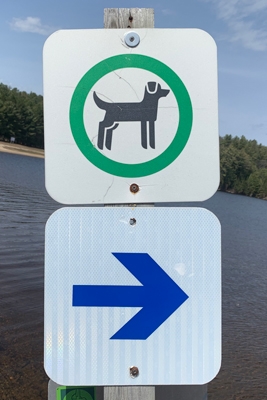Events Calendar
Current Weather
Pets (including Dogs) in Algonquin Park
Bringing a pet to Algonquin Park can be an enjoyable experience, but pet owners must follow specific pet related rules to ensure a positive experience for all Park visitors (including your pet). In general, leashed pets are allowed in all areas of Algonquin Park, with the exception of pet free areas listed below. Service dogs assisting disable persons are permitted in all public areas, including buildings.
Pet Free Areas in Algonquin Park
Pets, including dogs, are not permitted in the following areas of Algonquin Park:
- All Park buildings
- All campsites with roofed accommodation (Ranger Cabins, Yurts, Camp Cabins, except some Yurts and Camp Cabins at Mew Lake Campground where 2 dogs are permitted with an additional per night fee, see the Ontario Parks Reservation Service for specific campsites/buildings)
- Waters adjacent to all backcountry campsites where campers obtain drinking water
- Designated public swimming areas or on beaches (except pet [dog] beaches listed below)
- Radio/pet frees areas of:
- Mizzy Lake Trail
- Some special events and interpretive programs, such as Public Wolf Howls. See the specific program description in the Events Calendar for details.
- Other areas posted with "no pet/dog signage"

Dog Beaches in Algonquin Park
Algonquin Park has dog (pet) friendly beaches in the following locations. See the campground maps, and signage at the beaches, for specific locations.
Pet Related Rules & Responsibilities
- All pets must be on a leash not exceeding 2 metres (6 feet) in length at all times and in all locations, unless in a designated off-leash area or designated roofed accommodation
- Pets must be kept under control at all times, include preventing your pet from chasing and/or harassing wildlife.
- Pets are not permitted to make excessive noise or disturb others. Excessive noise from a barking dog which disturbs fellow campers is a top complaint in Algonquin Park. Pets, especially dogs, should not be left alone on campsites to bark and disturb surrounding campers. Park Wardens consider this excessive noise and can issue warnings or lay charges.
- Pets are not permitted in prohibited areas (see the complete list above) including:
- swimming areas,
- on beaches,
- in Park buildings,
- waters adjacent to all backcountry campsites where campers obtain drinking water,
- on campsites with roofed accommodation (see exceptions above)
- or in a posted prohibited area at any time.
- Pets are not permitted to cause injury (including damaging live vegetation).
- Pet owners are required to properly dispose of domestic animal excrement. If in a developed area, "stoop and scoop" and place excrement in the garbage (not the organics [compost] receptacles). If in the backcountry, pet owners must "stoop and scoop" and place pet excrement in privies (vault toilets) on backcountry campsites. Pet owners can be charged with failure to dispose of animal excrement appropriately.
- Pets should not be left unattended
- Pet food should be stored safely as to not be deemed a wildlife attractant (see below).
Enforcement
Park Wardens and Conservation Officers can issue warnings and/or lay pet related charges with fines from $95 to $125 for each offence. Pets may be impounded at the owner's expense. A Conservation Officer may kill a dog running at large without incurring any liability in specific situations. Protect your pet and Algonquin's wildlife - keep your pet on a leash not exceeding 2 metres (6 feet) in length at all times.
Pets as Food for Wildlife
Algonquin Park is a vast wild area, with many top predators. Domesticated animals such as dogs and cats can become food for animals such as Eastern Wolves, Black Bears, and Fishers. In order to ensure the best protection for your pet, consider leaving your pet at home.
Some people consider bringing your dog (or other pet) a solution to avoid wildlife confrontations. In fact, dogs may actually attract the attention of wildlife including bears. In some cases, dogs may nip at a bear and then run back to their human masters with the bear in pursuit. Keep your dog away from any bears. When in bear country, like Algonquin Park, know the bear safety rules.
Food for pets, such as dog food, should never be left unattended day or night. Pet food is considered a wildlife attractant and as such Park Wardens or Conservation Officers can lay charges for its improper storage. When in a developed campground or picnic area, store all pet food inside the closed trunk of your vehicle. In the backcountry, hang your pet food with your human food.
Related Information
Reserve your developed or backcountry campsite for your next visit.
Share your passion for Algonquin Park by becoming a member or donor.
Special regulations for Algonquin's special fishery.









